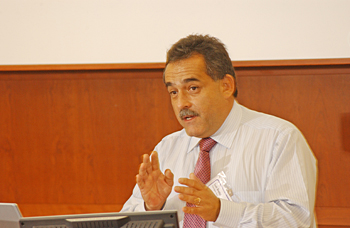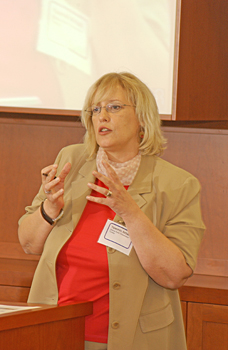Participating in the three-day symposium, “Transforming Undergraduate Education: Promises, Benefits and Limitations,” were 70 educators from Turkey, Iceland, Ecuador, Peru and seven U.S. universities, including UD.
The symposium brought together colleagues, working to incorporate PBL into their schools' curricula and to discuss, one-on-one, the problems and rewards that came with the experience. It also offered workshops on techniques for teaching writing, integrating writing into the classroom, technology and learning and how to take learning beyond the classroom using research, service learning, study abroad and residential community engagement.
Presentations by Yasemin Arbak, a professor at Dokuz Eylül Üniversitesi in Turkey; Luis Bretel formerly of the Pontificia Universidad Católica del Perú; and Mohan Agrawal, director of the business school at the Jaypee Institute of Information Technology University in India, detailed their links with ITUE and their use of active, student-centered approaches on their campuses.
Bretel spoke through an interpreter, and Agrawal joined the group via a video link from his campus in Noida, India. During a question-and-answer session after the presentations, the three were asked about the hurdles they faced in bringing PBL to their schools.
Arbak, Bretel and Agrawal agreed that class size, a perception that student-led learning is lacking in discipline, the need for a willing administration and difficulty in getting students and teachers to adapt to becoming facilitators rather than lecturers were the most pressing problems they had to overcome.
Arbak said she found getting students and teachers to use interactive methods in the classroom and for teachers and the administration to accept that the students would be directing their own learning was difficult. Bretel stressed that just as important is the school administration's willingness to accommodate change. Agrawal, who directs the Jaypee Business School, said his school promotes active learning in each classroom.
At a reception and poster session held at the Louise and David Roselle Center for the Arts on June 13, UD Provost Dan Rich and Thomas Apple, dean of the College of Arts and Sciences, praised ITUE as an innovative leading faculty development center for problem-based learning.
Rich said that the U.S. Agency for International Development, through the American Liaison Organization, funded a recent 3-year project in science and math education reform in Peru where bilingual ITUE workshops were offered in Spanish. Twenty-four engineering deans from northern France participated in a bilingual workshop in French and ITUE leaders have facilitated countless workshops nationally, from leading research universities to community colleges, from high schools to church education societies, he said.On campus, ITUE has offered institutes, programs and symposia. “I am proud of the fact that more that 370 UD faculty and staff, representing 60 departments and units across the University have participated,” Rich said.
George Watson, senior associate dean of arts and sciences and one of the founders of the institute, said that ITUE's global reputation “has resulted in our faculty leaders being invited to present workshops in Malaysia, Ecuador, Bolivia, Lebanon, Turkey, Iceland, Japan, India, Jamaica and Canada, with future plans for Taiwan, Bosnia and a return to India and South America.”
In keeping with ITUE's primary mission, which is to promote the use of active learning and effective use of technology in undergraduate education, Watson said, UD has become the home of the PBL Clearinghouse--a peer-reviewed database of more than 100 field-tested PBL problems across a wide variety of disciplines. “There are currently 11,500 active users of the clearinghouse,” he said.
“ITUE has been successful in attracting the interest and funding of such agencies as the National Science Foundation, the Pew Charitable Trusts, the Howard Hughes Medical Institute and a partnership with the New Castle County Vocational Technical School district, as well as multiple faculty development units on campus,” he said.
Watson said that there are many faculty who should be credited with founding and nurturing the institute. “Along with Barbara Duch, [retired associate director of the Mathematics and Science Education Resource Center], ITUE was founded by Hal White and Susan Groh in the Department of Chemistry and Biochemistry, Deborah Allen in the Department of Biological Sciences and Harry Shipman in the Department of Physics and Astronomy. From its origins in the sciences, ITUE has expanded to embrace all disciplines across the University,” he said. "Today, Steve Bernhardt, the Andrew B. Kirkpatrick Chair in Writing and chairperson of the English department, and Mark Serva, assistant professor of accouting and management information systems, are valuable members of the team and bring writing across the curriculum and effective use of emerging technology to our expanding mission," Watson said.
Article by Barbara Garrison
Photos by Duane Perry




